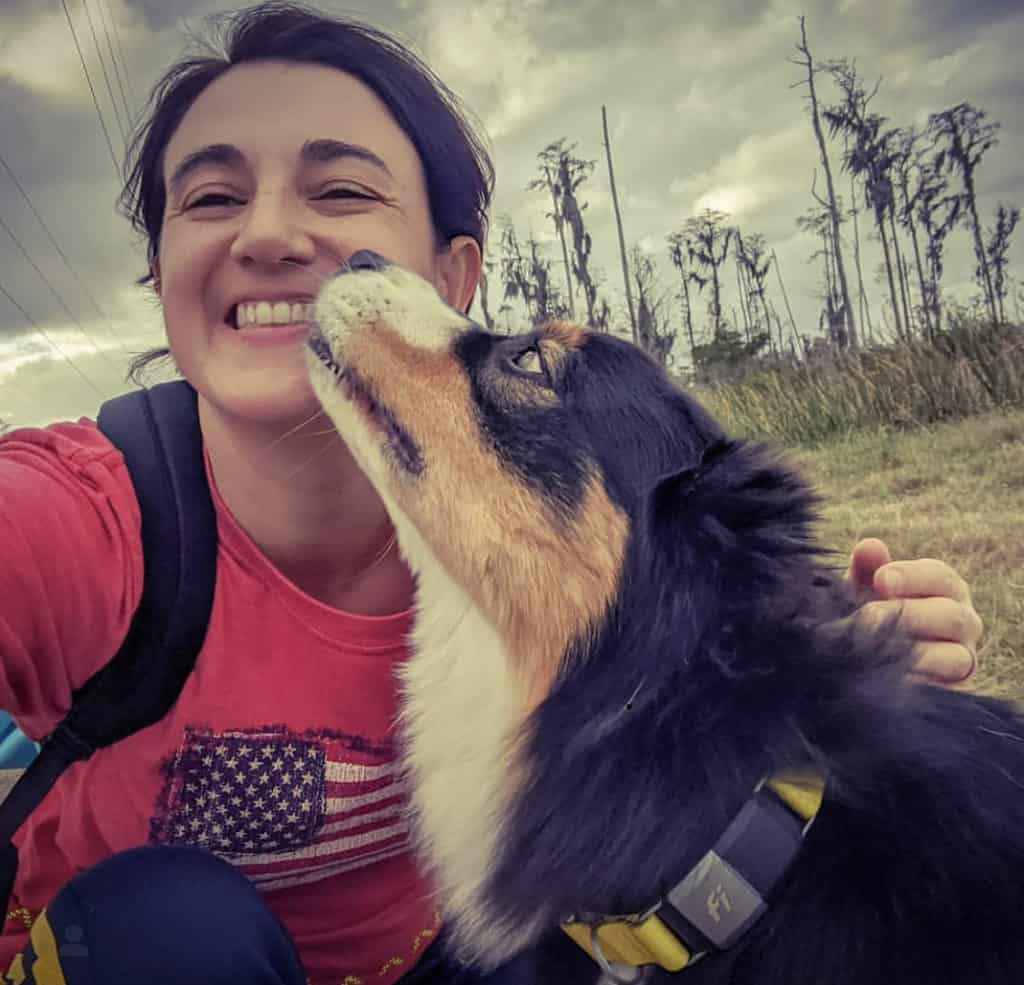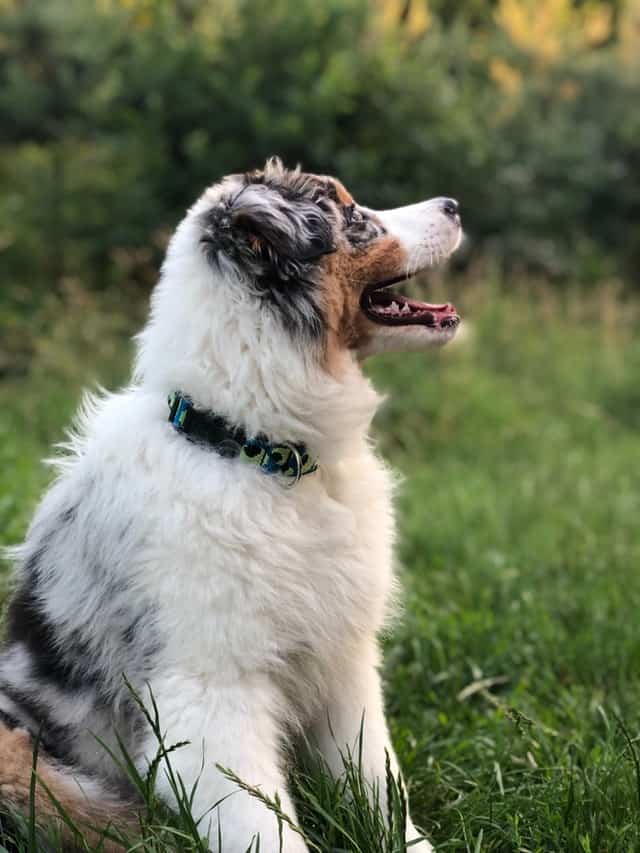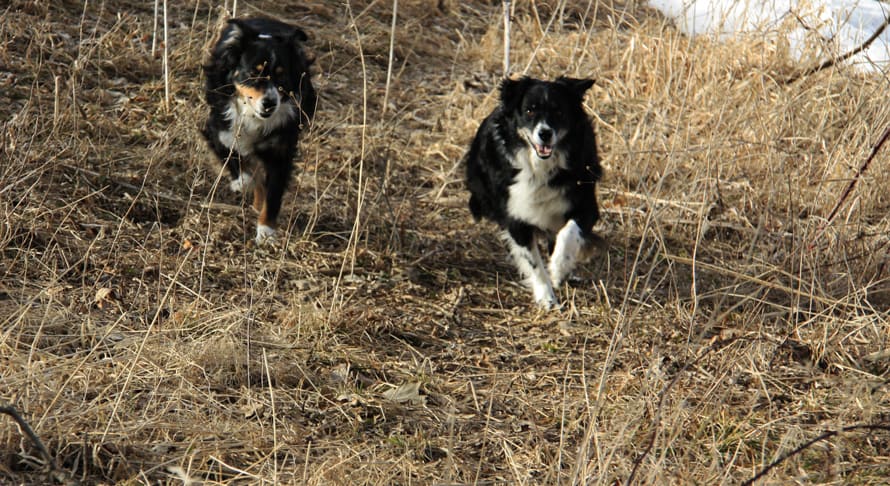In your research for a dog breed, you’ve come across the Australian Shepherd. You love the sweet, exciting nature of the breed, but you wonder “are Australian Shepherds protective of their owners?
Australian Shepherds will act very protectively around their owners and immediate family. Outsiders may make the Aussie cautious and guarded and sometimes even aggressive depending on whether you’ve socialized your dog.
In this article, we’ll discuss more about the temperament of the Australian Shepherd as well as where their protectiveness comes from. We’ll even discuss methods for adjusting your dog to new people, as this isn’t always easy, even if it is necessary.
Keep reading!

The Temperament of an Australian Shepherd
Aussies are known for being smart, enjoying closeness with their favorite people, and for their friendly nature. If your Aussie has been your shadow since you brought him or her home the first day, this is also normal.
The Australian Shepherd tends to get attached to its owner, maybe even over-attached. This can lead to clinginess, as your Aussie won’t want you out of their sight for even a second. Of course, the Australian Shepherd doesn’t want to just passively be with you, but rather, they prefer to be the center of attention. The dog craves lots of love and companionship whenever possible.
When you do activities at home together as a family, from baking in the kitchen to playing board games in the living room or enjoying a barbeque out in the backyard, you can bet your Aussie will be right there with you. If not, they’ll be crying and making sad eyes until you let them join you.
This unconditional love for you, their owner, and your family go hand in hand with another trait of the Australian Shepherd. That is, they’re very protective. Anyone who comes to your home, be that a friend, distant relative, or even the pizza delivery person or mailman will arouse suspicion in your Aussie because this person isn’t an immediate member of the family.

Where Does the Australian Shepherd’s Protectiveness Come From?
Why does the Aussie have such an obsessive, protective streak? It’s due to the dog’s history as a herding breed. Many other dogs in the herding group tend to possess the same level of protectiveness.
The Australian Shepherd may have first appeared in Spain, where it was a favorite dog of shepherds (that might be where its name comes from, at least half of the name). The shepherds didn’t stay in Spain, but rather, migrated to the United States’ west coast, passing through Australia as they did (and there’s the other half of an Aussie’s name and where it may have come from).
A somewhat newer breed of dog, the Australian Shepherd’s origins seem to date back to the 19th century. In the Rocky Mountains, the dog herded sheep, not minding the changes in altitude in the steep mountains. Then, sometime between the 19th and 20th centuries, Boulder, Colorado-area ranchers bred the Australian Shepherd so more people could take advantage of the dog’s sheep-herding abilities.
Herding dogs like to gather their flock and keep them safe together. That could explain why this same attitude has stuck with the Aussie when it comes to you and your family, aka their favorite people.
Are Australian Shepherds Protective?
You have another question.
Will your Australian Shepherd protect you and your family?
Yes indeed, as your Aussie is quite a good protector, at least to a certain degree.
As we discussed in the first section, Aussies tend to be wary of anyone who doesn’t live in their household. You may notice your dog holds back, sizing up what they perceive as a threat. Some Australian Shepherds will always act shyly when someone new comes over to the house or when you bump into an old friend on a walk with your dog. Others though can become aggressive, barking, and even trying to attack in some instances.
This probably isn’t the kind of protection you want, not from the people you’re willingly inviting into or around your home. Instead, you’re more concerned about your dog alerting you if a burglar were on the premises, for instance. Can your Aussie do that?
Yes and no.

Most Australian Shepherds are especially sensitive to noise. The louder the noise, such as fireworks, a car backfiring, or thunder, the stronger a reaction it will elicit out of your Aussie. So yes, if someone were to try to noisily break into your home, your dog would hear it and probably begin barking.
Then again, if someone’s walking down the block and being too loud, your Aussie will also bark at that, and this person is not a threat.
Australian Shepherds are Expert Watchdogs
As a herding breed, Australian Shepherds are expert watchdogs. They will park themselves at a vantage point where they can see what’s going on outside. This will certainly make you feel safe. As a watchdog though, that means the Aussie is not a guard dog, and yes, there’s a difference.
A watchdog will look out for threats and then bark to alert you to the presence of that threat. These dogs rarely get violent because it’s not in their temperament. It’d be your responsibility to address and take care of the threat, which can sometimes be dangerous.
Guard dogs, on the other hand, will look out for threats like watchdogs, but they do more. If the situation seems serious enough, a guard dog will jump into the fray, biting, scratching, or barking to ward off the threat.
Some common guard dog breeds include the Rottweiler, Doberman Pinscher, German Shepherd, Giant Schnauzer, Bullmastiff, Great Dane, Great Pyrenees, Dutch Shepherd, Belgian Malinois, American Bulldog, Cane Corso, and Beauceron.
If you noticed a common thread with the dogs on that list, it’s that they’re all large canines. Watchdogs aren’t restricted by size though. Even a Chihuahua can be an effective watchdog, but one obviously won’t attack as a guard dog would.
Guard dogs can be friendly, but the size and temperament of this breed are off-putting to some. These people would feel more comfortable and safer with watchdog like the Aussie, and rightfully so.
How to Make an Aussie Adjust to Outsiders
You’re glad you have a protector in your Australian Shepherd, but it’s quite annoying when your friend comes over to the house every week and your dog goes crazy, barking and making noise. It’s also a pain to have to corral your dog elsewhere when the plumber shows up. Is there any way to have your Aussie adjust to your friend, the plumber, as well as anyone else who might come over to the house?
Yes indeed, through socializing. Ideally, you should socialize your Australian Shepherd young, between seven weeks and four months old. This is when the dog is ripe for socializing.
Socializing Your Aussie
Early socialization shows your Aussie at the beginning of their life that other people are not threats. Sure, your Aussie won’t have the same affinity for these people as they do for you, nor would you want them to, but your dog will be a lot quieter around others.
You can still socialize your Australian Shepherd if they’re older, but it’s going to take a lot more hard work and effort to make these new habits stick. That’s because, for years now, your Aussie has viewed other people a certain way–as threats –and you’ve never done anything to change that. Now you are, and that’s a huge 180 for your dog.
Okay, so how do you begin socializing your Aussie? By bringing them out into the world! As often as you can, you want your dog to interact with people. These can be strangers you see on a walk, your neighbors from down the street, or friends and family members in your home. The more variety you can introduce with these social situations, the better. This trains your Aussie to understand that almost all social situations are safe.
If you’ve socialized your dog around your town, then go for a walk in the next neighborhood or bring your dog to your friend’s house instead of your buddy coming over to your place. This continues to expand the horizons of your Australian Shepherd.
How-To Socialize Your Australian Shepherd
Having a tough time socializing even a younger Aussie? It happens. Try giving your dog treats for good behavior around others just as you do when training them in other ways. If your Aussie is several years old but isn’t taking to socialization as quickly as you would have preferred, again, remember this normal. Also, keep at it. Unsocialized Australian Shepherds can go from being shy to aggressive, as we said. If your dog bites your friend or your DoorDash delivery person, you could get in huge trouble.
Are Australian Shepherds Protective: In Conclusion
Australian Shepherds have a history of herding flocks close together. Thus, they like it when their family is close too. Aussies are also very protective of their owners and their immediate family. By socializing your Aussie within their first seven weeks to four months of life, you can prevent the barking and aggression that stems from their weariness around strangers. Best of luck!

